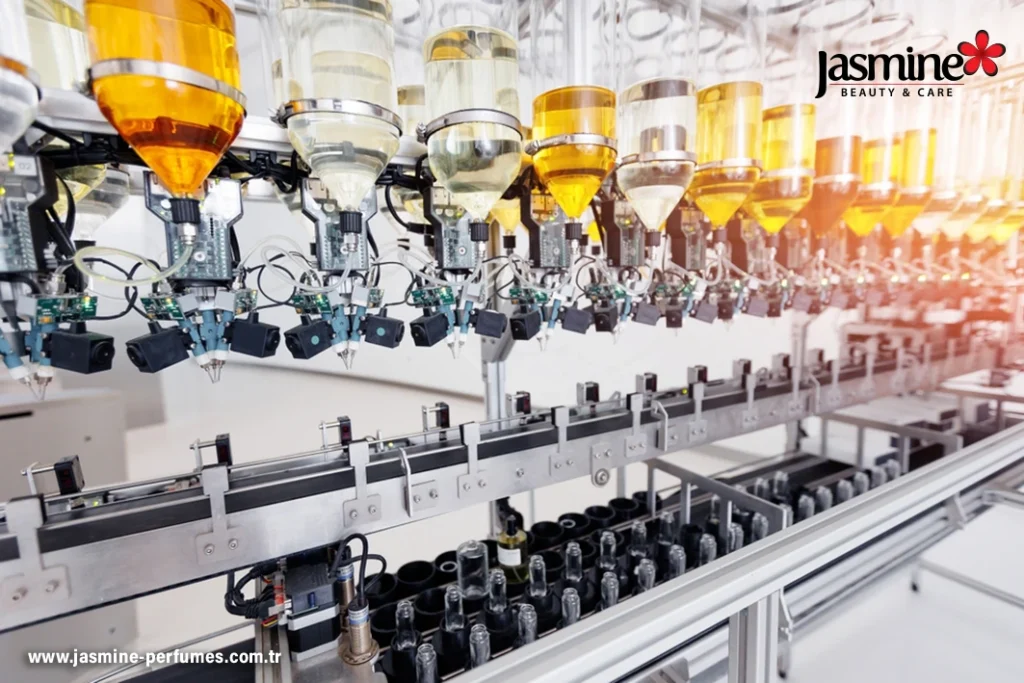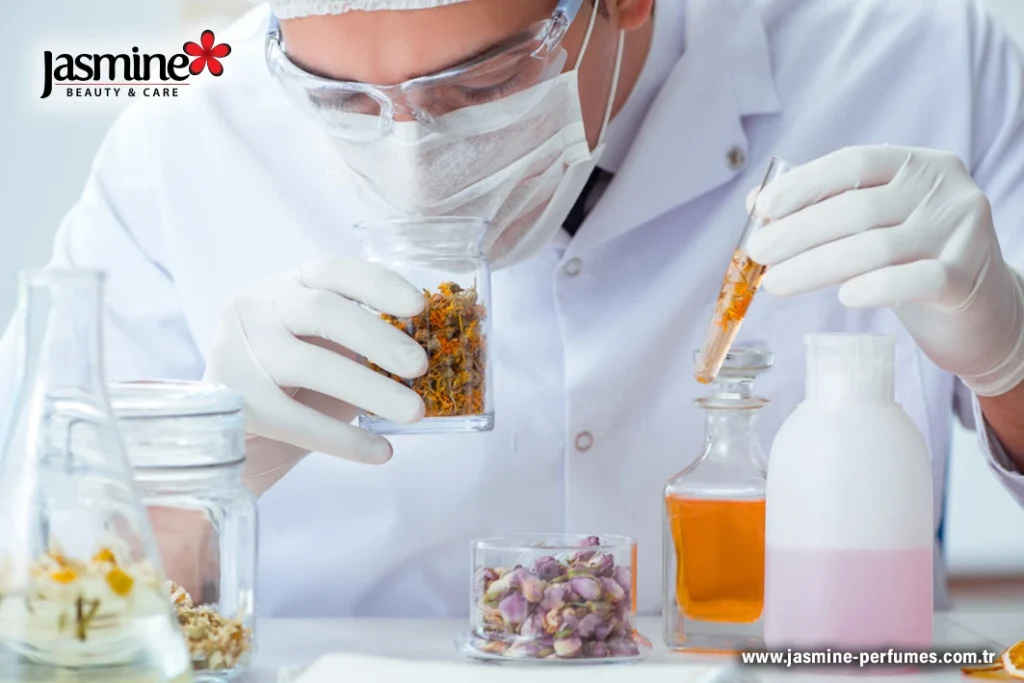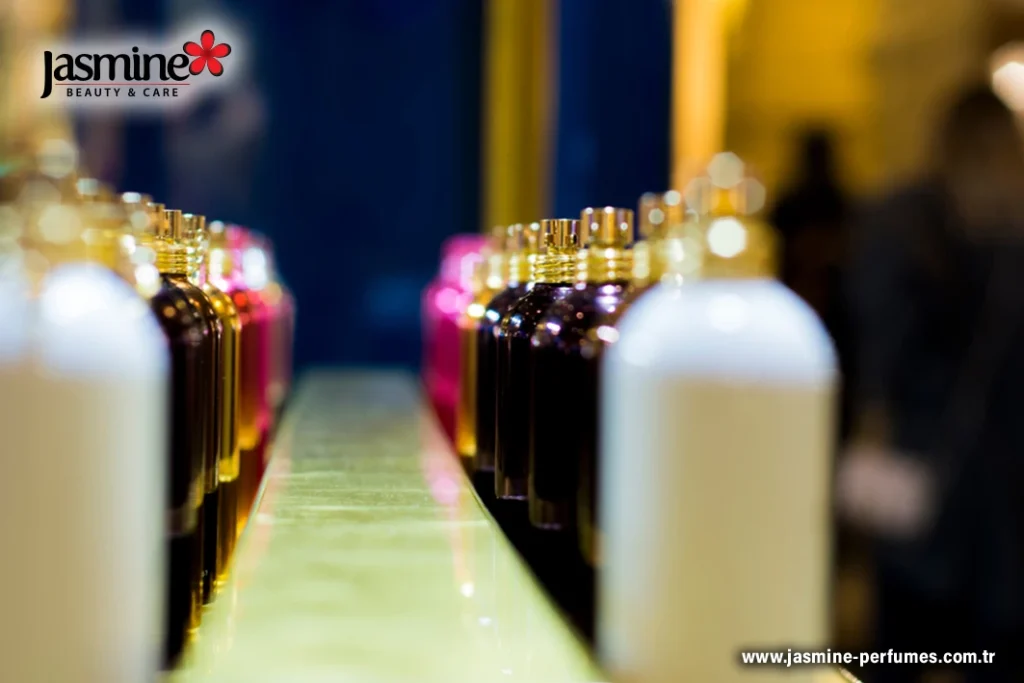In the constantly evolving landscape of perfume production and regulation, ensuring the safety guidelines of perfume industry has become a top priority for manufacturers. Through this article, we at Jasmine invite you to learn about safety standards in perfume factories, how you can enhance them by integrating technology, and what are the key preventive strategies to adopt?
Key Safety Guidelines for Perfume Industry
Ensuring safe rules in perfume industry not only maintains trust between your brand as a perfume manufacturer and your customers but also establishes sustainable and safe products. So, what are these standards?
Compliance with the IFRA Standards
All used ingredients must comply with the regulations of the International Fragrance Association (IFRA), which imposes strict restrictions on certain substances to ensure they do not cause allergies or health harm. Your compliance with these standards means risk-free perfumes and a trustworthy brand.
Quality and Sensitivity Testing
Before launching a perfume, thorough tests must be conducted to determine its compatibility with different skin types and to ensure its long-term stability, as well as safety in use. Such tests reduce the likelihood of any adverse effects, providing confidence in your product and increasing its credibility among customers.
Safe Packaging System
This involves designing packages that protect the perfume from contamination and maintain its quality during transportation and storage. This includes using high-quality materials and providing clear instructions and necessary warnings on the package.
Adherence to Regulatory and Technological Updates
Safety laws and standards in the perfume industry are continuously updated based on scientific research. Keeping up with these changes and adhering to them ensures that you deliver products that meet the requirements of the modern market and reflect your brand’s commitment to consumer safety.
Ingredient Tracking and Production Safety
By establishing an internal tracking system for used ingredients, you can quickly identify any issues in the production chain, with the necessity of having accurate records of ingredients and suppliers. This system enables you to monitor products and make immediate interventions for any safety-related issues.
Ongoing Training
Keeping the Production and Quality Teams updated with the latest recommendations and standards is essential for the safety of perfume manufacturing. Therefore, setting up regular training programs for your team helps reduce errors and ensure the production of high-quality perfumes that meet safety tests on skin and respiratory systems.
At Jasmine Factory, we can provide you with all the safety standards for perfumes due to our experience in this field and our commitment to implementing all relevant global updates. Contact our team for any inquiries or questions.

Accident Prevention and Response Strategies in Perfume Industry
Like any other industry, the perfume industry is not immune to accidents, which you have likely encountered and managed in your factory. Therefore, it has become crucial to adopt safety procedures in the workplace, including preventive strategies that minimize such incidents and provide immediate responses in case of emergencies. Here are the most important ones:
Chemical Storage Procedures
This minimizes the risk of unwanted reactions and spills. Therefore, you should store raw materials in environments specifically designed and compliant with international standards, such as controlling temperature and humidity and placing clear labels on containers to indicate safe handling procedures.
Ongoing Workplace Safety Training
Organize regular training courses to educate workers on the safe handling of aromatic materials, the use of personal protective equipment, and emergency responses. This enhances awareness and ensures the implementation of correct practices during manufacturing.
Emergency Response Plan
It is a priority to create a comprehensive response plan that covers various emergency scenarios such as chemical leaks or fires. This means conducting regular training for your employees to assess their readiness and ensure their quick response, minimizing damage in the event of accidents.
Hazard Detection Systems
Such as gas detectors and automated control technology that allows for quick identification of potential problems and reduces human interaction with hazardous operations. Integrating these systems with safety management software enhances emergency responses and ensures coordination among teams within your factory.
Facilities and Equipment Maintenance
Subjecting them to regular maintenance can detect any potential weaknesses in the safety system. By obtaining early detection of faults and correcting them quickly, you prevent small issues from developing into major incidents that could definitely affect the continuity of safe operations.
Personal Protective Equipment
Do not overlook this point; providing protective gear such as gloves, protective masks, and glasses for workers and ensuring their compliance with them reduces their direct exposure to chemicals and thus the risks of injuries from contact or inhalation.
We are ready to offer all the advice needed to ensure you implement the best safety strategies within your factory. Our experience is shared with you through our team, ready to respond to your call. Do not hesitate to request it.
Also read: Best Perfume Risk Management Strategies in 2025

How Tech improves Safety in Manufacturing Facilities?
In the ever-evolving world of perfume manufacturing, adopting technological solutions to enhance safety and ensure efficient operations is crucial. What are the key tools you can implement in your factory?
Advanced Sensing Systems
Installing sensors to detect harmful gas concentrations or chemical leaks provides instant monitoring of any issues. These systems send alert notifications, enabling you to take immediate action when levels reach unsafe limits.
Robotics in Hazardous Applications
Robots offer a safe alternative for performing dangerous tasks such as handling flammable materials or mixing and packaging fragrance ingredients. This not only protects your workers from harmful chemicals but also reduces human errors and enhances the accuracy of production processes.
Digital Safety Management Systems
These systems allow you to monitor operations, track performance indicators, and automatically document incidents and corrective actions. This enables quick response to any malfunction or accident, reducing downtime, and maintaining the safety of the factory and employees.
VR Training
Virtual reality training simulates emergency scenarios in a safe environment, preparing workers to handle various potential emergencies. This enhances your employees’ readiness without exposing them to actual risks and reduces their stress when dealing with real situations.
IoT monitoring
Connecting devices and systems using IoT concepts allows for continuous monitoring of environmental conditions within the factory. This includes temperature, humidity levels, and gas concentrations, enabling you to identify potential problems early and make proactive decisions to avoid risks.
Also read: Perfume Industry: How technology Transform the Perfume Business?

Jasmine is The Best Wholesale Perfume Factory in Turkey and the Middle East
Innovation, quality, and credibility succinctly define us at Jasmine Perfumes and Fragrances, earning us recognition as a leading perfume manufacturing companies in Turkey and the Middle East. We rely on the latest technologies and international standards to deliver products that meet the expectations of both local and global markets with superior quality and competitive prices. Thanks to the diversity of our fragrance collections and our flexibility in meeting various brand needs, we have become the preferred choice for companies seeking excellence in the perfume sector.
FAQs About Safety Guidelines in Perfume Industry
What are the Hazards of Perfume?
The risks associated with perfumes include the potential for some ingredients to cause allergic reactions on the skin or irritate the respiratory system, especially in individuals with high sensitivities.
What Happens if You Inhale Raw Materials?
Inhaling raw materials in perfume manufacturing can irritate the respiratory system or cause allergic reactions, particularly if they contain concentrated or unsafe chemical compounds. Therefore, wearing personal protective equipment and ensuring good ventilation significantly reduces these risks.
How Do You Improve a Safety Culture in Perfume Factories?
Improving safety in a perfume factory requires the adoption of advanced monitoring systems to detect chemical leaks and ensure optimal ventilation throughout the manufacturing process. Using personal protective equipment for workers and developing effective emergency response protocols with regular training on safe handling of fragrance materials are essential.
How To Properly Store Perfume?
Store perfumes in a dark, dry environment away from direct sunlight to prevent the decomposition of their ingredients. Use shelves resistant to heat and humidity, ensure bottles are tightly sealed to minimize the evaporation of scents and loss of quality, and organize inventory in a way that facilitates accurate tracking and ensures product rotation based on production dates.